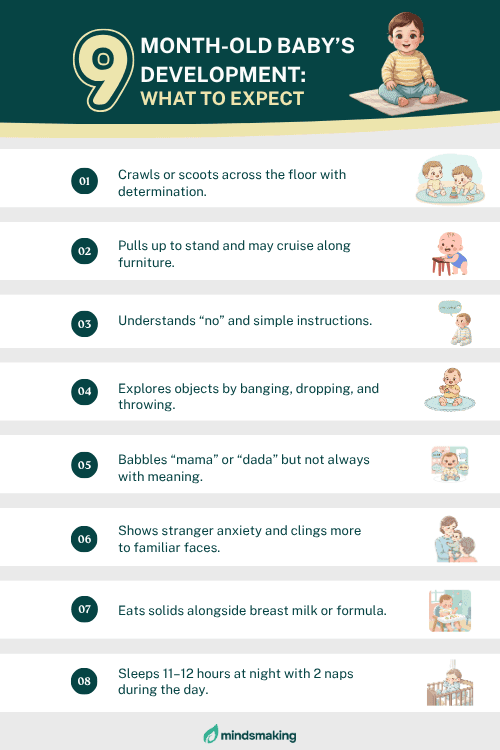9-Month-Old Baby Development and What to Expect

Written by Mindsmaking Medical Writer
Fact Checked by Mindsmaking Professionals
1st, December, 2025
Your 9-month-old is becoming a little explorer: crawling, sitting tall, giggling at games, and even settling into better sleep. Yet there is still so much more to look forward to at this exciting stage.
At 9 months, your baby is now more mobile, curious, and always ready to reach new milestones. From sitting without support to crawling and even pulling up to stand, your little one’s motor skills have come a long way this month.
Your 9-month-old baby’s development is not just about movement; they are now starting to respond to their name, laugh with their whole tummy, and enjoy playful games like peek-a-boo and Pat-a-cake. Their social and communication skills are also improving all at once.
By now, your baby is a true little explorer, turning every corner of your home into a mini adventure. With a 9-month-old like this, expect your days to be full of surprises, giggles, and just the right amount of worries.
Key Takeaways
By 9 months, your baby’s motor skills shine as they crawl, pull up to stand, sit independently, and begin using the pincer grasp, turning everyday moments into mini milestones.
At 9 months, your baby’s curiosity blossoms as they recognize their name, understand simple commands, and explore cause-and-effect through playful problem-solving.
A 9-month-old baby forms stronger bonds, shows separation anxiety, enjoys interactive play, and communicates preferences through smiles, gestures, and choices.
A 9-month-old baby uses babbling, simple gestures, and responses to words or commands as early signs of developing communication and language skills.
At 9 months, babies need 3 solid meals plus breastmilk or formula, with textures, finger foods, and cup practice introduced; patience is key as picky eating and messy self-feeding are normal parts of learning.
At 9 months, babies sleep 11–14 hours daily with two naps, and consistent bedtime routines help manage night wakings and separation anxiety while supporting healthy growth and emotional security.
Supporting your 9-month-old’s development means creating safe spaces to move, playing interactive games, reading together, and encouraging self-feeding and early communication through sounds and gestures.
At 9 months, baby-proofing, safe teething relief, avoiding choking hazards, and keeping up with immunizations are key to protecting your little one while they explore and grow.
If your 9-month-old is not sitting, moving, babbling, responding, or showing interest in people and play, it may be time to seek medical advice for possible developmental concerns.
Physical and Motor Development
Your baby’s motor skills are really starting to shine at 9 months. They are becoming more mobile and curious, which means more amazing moments and a bit more work for you. Here is how your 9-month-old is developing this month.
Physical and Motor Development

Sitting
Your baby can now sit steadily without support. This lets them balance, reach for toys, and explore the world while on their own. It opens up so many developmental activities, from flipping through board books to stacking blocks, while keeping you entertained with their curiosity and little antics.

Crawling
Your baby is often crawling confidently now, though some may still scoot, shuffle, or creep. Watching your little explorer move across the room is exciting, impressive, and a gentle reminder to keep an eye on everything within reach.

Pulling up to stand
Around this age, your baby may start pulling up and “cruising” along furniture. This milestone shows growing physical development, strength, and balance. Suddenly, your living room becomes a mini obstacle course, with tiny hands clinging to the sofa as your baby practices side-stepping like they are used to it.

Pincer grasp
Your baby is starting to use the pincer grasp, picking up tiny objects with thumb and forefinger. This is a big step toward self-feeding and developing fine motor skills. Watching your baby pick up anything within reach is impressive, can be a little messy, and is all part of their 9-month-old development.
Cognitive Development
Once your baby reaches 9 months, their mind starts to buzz with curiosity and new ideas. This is a sign of their brain expanding and developing. Even the simplest play becomes an opportunity to learn, explore, and discover the world around them. Here is a glimpse of how your baby is thinking and learning this month:
Object Permanence: Your baby is starting to understand that things still exist even when out of sight. This is why peek-a-boo suddenly becomes hilarious, your baby is anticipating your reappearance with excitement and delight.
Understanding Commands: While they may not follow complex instructions yet, your baby can start responding to simple cues like “come here” or “give me the toy.” This is a wonderful sign of growing awareness and communication skills in babies.
Responding to Their Name: Your baby is learning to recognize their name and may turn, smile, or reach out when you call. It’s a heartwarming milestone that shows increasing social awareness and connection.
Problem-Solving Skills: Your little one is testing cause and effect, figuring out different ways to reach a toy or manipulate an object. This curiosity is an important part of a 9-month-old baby’s development and supports both cognitive and motor growth.
Curiosity Through Exploration: Everything is interesting at this stage. Your baby explores by touching, shaking, mouthing, and banging objects to learn more about them. These one-on-one experiments are essential for learning and make even ordinary household items a source of wonder.
Social and Emotional Development
As your baby turns 9 months, their personality starts to show in new ways. Social interactions become more meaningful, and you will notice your little one expressing themselves more clearly. Here is how your baby’s social development may show up this month:
Shyness Around Strangers: Your baby might cling to you or look unsure around new faces. This is perfectly normal and shows they are forming strong attachments. It is also a reminder that your little one knows exactly who their favorite people are, and that is either you or other familiar faces.
Separation Anxiety: Leaving the room or handing your baby to someone else might trigger a few tears or your baby trying to reach for you. While this can tug at your heartstrings, it is actually a sign of growing awareness and emotional bonds that come with a 9-month-old baby’s development.
Interactive Play: Peek-a-boo, pat-a-cake, waving, and clapping become absolute favorites. Your baby’s laughter and engagement during these games are not just adorable, it is the beginning of improved social skills, understanding of cause and effect, and communication.
Expressing Preferences: Your baby is starting to show likes and dislikes more clearly. Whether it is reaching for a favorite toy, turning away from certain foods, or smiling at familiar faces, these little expressions are your baby’s way of communicating and exploring individuality.
Read This Next
No posts available
Communication and Language
At 9 months, your baby is discovering exciting ways to express themselves. Their babbles, gestures, and reactions are becoming more purposeful. This shows early signs of real communication skills. You will notice them experimenting with sounds, responding to words, and using gestures to interact with you and their surroundings. They may not be having full conversations yet, but you will see them expressing themselves more clearly in several ways.
- Your baby is babbling with repeated sounds like “mamama” and “dadada.” These early attempts at speech are exciting signs of developing vocal skills.
- Your baby responds to simple commands such as “come here” or “no,” especially when accompanied by gestures, which shows an emerging understanding of language.
- Your baby recognizes words for familiar people or objects, and looks toward them when called by their name. This demonstrates early comprehension.
- Gestures like pointing, waving, and shaking their head are starting to appear, which helps your baby express needs and emotions before they can use words.
Food and Nutrition
By 9 months, your little explorer is probably more interested in picking up the spoon than using it properly, and that is a great sign. This is the stage where your feeding schedule becomes an adventure rather than just a routine. Expect 3 solid meals a day, alongside breastmilk or formula, as your baby’s main source of nutrition.
Introducing textures and finger foods is the next big milestone. Soft chunks of cooked vegetables, small pieces of fruit, or baby puffs are perfect for their tiny fingers. Let them squish, smoosh, and taste. Of course, it may get messy, but that is also part of learning.
Encourage self-feeding because this helps develop fine motor skills and builds independence. Offer safe, manageable pieces, and watch your baby proudly get food from plate to mouth. Always supervise, because even the tiniest hands can try ambitious bites.
Foods to avoid
- Honey
- Cow's milk
- Whole nuts and peanuts
- Grapes, cherry tomatoes, popcorn, and raw carrots
- Added salt and sugar
- Unpasteurized dairy and raw or undercooked eggs
- Processed meats like sausages or deli meats
- Caffeinated drinks and fruit juices should be avoided
- Sticky foods like marshmallows
- large pieces of dried fruit
This is also the perfect time to introduce cup drinking. Start with a sippy cup or a small, open cup to encourage sipping, and gradually reduce bottle use. Your baby might spill more than they drink at first, but that is all part of the learning process.
It is normal for babies to be picky eaters or have selective eating habits. One day they love mashed peas, the next day they act like it is lava. Take a deep breath, stay patient, and keep offering a variety of foods, even if they reject them a few times. Repetition is important, and your persistence can help them learn to enjoy different tastes and textures over time.
Sleep and Routine
Your 9-month-old is beginning to settle into more predictable sleep patterns, though night wakings may still be there. At this stage, most babies get around 11–14 hours of total sleep in 24 hours, including 10–12 hours at night and two daytime naps. While it may seem like a lot of shut-eye, these hours are vital for physical development. It gives their growing muscles and busy little brain the rest they need to explore, learn, and master new skills.
Separation anxiety can turn bedtime into a dramatic performance. That cheerful baby you know might suddenly protest when you leave the room. This is a normal part of social development and attachment. Comforting your baby with consistent routines, whether it is a warm bath, a gentle cuddle, or a short story, helps them feel secure while learning that you always come back. This is an important step in building trust and emotional awareness.
Sticking to a consistent bedtime routine now benefits both you and your baby. Even if your little one tests boundaries or fusses occasionally, keeping regular sleep and wake times supports better rest and overall development.
How to Support Your 9-Month-Old’s Development
Encouraging your 9-month-old’s development is one of the most rewarding parts of parenthood. Every small achievement builds their confidence, strengthens your bond, and supports critical growth. At this age, babies are curious explorers, and providing the right opportunities helps them reach key 9-month-old baby milestones while having fun along the way.
- Provide a safe space for crawling, standing, and cruising.
- Read daily, point to pictures, and name objects.
- Play simple games like peekaboo and clapping.
- Offer safe finger foods for self-feeding.
- Encourage communication with gestures and sounds
Common Health and Safety Tips
While this stage of your 9-month-old baby’s development is full of exciting milestones, it also calls for a little extra vigilance to keep things safe and healthy. There are some essentials every parent should keep in mind.
- Baby-proof furniture, stairs, outlets, and cords so your little one can crawl and cruise safely without turning your heart into a panic button.
- Teething may continue, and while drool bibs might feel like part of your baby’s daily outfit, soothing sore gums with safe teething toys can bring relief for both of you.
- Avoid choking hazards such as coins, buttons, beads, or small toys; basically anything that could fit into those curious little mouths.
- Stay on track with immunizations and checkups to support your baby’s health as they hit new 9 month old baby milestones.
Development Problem Signs
Not every baby hits milestones at the same time, but sometimes delays can signal that extra support is needed. At 9 months, it’s important to watch for signs that may need a doctor’s attention.
- Not sitting without support.
- Not crawling, scooting, or trying to move.
- Not babbling or experimenting with sounds.
- Not responding when their name is called.
- Showing little interest in people, eye contact, or interaction.
- Not transferring objects from one hand to the other.
- Not pointing to objects or following your gaze.
- Seeming unusually floppy or stiff when held.
- Losing skills they once had, like babbling or reaching.
- Not engaging in simple games like peekaboo or clapping.
A Word from Mindsmaking
Every baby grows at their own pace, and what may seem like a delay could simply be your little one taking their time. Still, being aware of possible concerns helps you act early if needed. If you ever feel unsure about your 9-month-old baby’s development, trust your instincts and reach out to your doctor for reassurance and guidance. Parenting is a journey filled with both surprises and milestones, and you do not have to walk it alone.

Was this article helpful?
How many stars are you giving this article?
Leave a comment
Your email address will not be published.